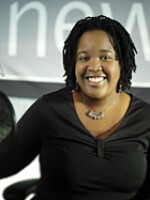ED GORDON, host:
From NPR News, this is NEWS AND NOTES. I'm Ed Gordon.
When it comes to domestic violence, numbers do lie. Each year thousands of incidents of spousal abuse go unreported or unprosecuted, all the more reason to be startled by the latest official numbers, more than 5 million incidents of domestic violence each year. Of those, battered wives and girlfriends sustain more than 2 million injuries.
But there is hope. NPR's Farai Chideya recently visited a shelter for battered women in Los Angeles and has this story.
FARAI CHIDEYA reporting:
The first things you see when you walk out the back door of the Jenesse Emergency Shelter are sunflowers. They're painted on a wall adorned with the phrase from civil rights activist, Fanny Lou Hamer.
Ms. SHERRELL(ph) ROBERTSON: I'm sick and tired of being sick and tired. And so they painted that on the back wall with the flowers.
CHIDEYA: Sherrell(ph) Robertson does public relations and fundraising for the center. She's six month pregnant and her belly leads her around the well kept home where up to 34 women and children stay at a time.
Ms. ROBERTSON: All our facilities have some housing element that's handicapped accessible, because we don't want any barrier to keep a woman and her children from staying at our facility.
CHIDEYA: We can't disclose the location or the identity of the women here.
For an emergency shelter, the house seems so calm. Several women sit in a comfortable living room laughing and watching television.
One of them is 19 year old Erica, not her real name. She's got an adorable infant son. His father abused Erica during their two year relationship.
ERICA: Since he was the only one working at the time, he felt as if anything he said I would have to do because he was a little older than me. And it's like physically he abused me, mentally, emotionally. Never sexually. But you eventually get tired of it.
CHIDEYA: Erica looked on the Internet, found the Jenesse Center, and called their 24 hour hotline. Like many women in her position, she didn't know what to expect.
ERICA: Well, when I first got here, it's like you nervous, but it's nice. I love the staff here. The clients here. Everybody try to make you feel at home. It's like we're you're one big family. We get up, go to school, take care of the kids, eat, do our chores. Have therapists when we need them.
It's a very good program. I would recommend it. If I would have known about it a long time ago, I would have been here.
CHIDEYA: Twenty five year old Veronica is also staying at the house. With three kids and one on the way, the choice to leave was painful.
VERONICA: I've been with my husband for 10 years, since I was 14, so I love him a lot, you know. We have three kids together. I always put my heart to try to work out the relationship, but I figured I had to put myself first and my kids first.
CHIDEYA: Veronica decided to leave when she thought to herself, My son could become like his father.
Experts say that children who grow up in abusive homes are more likely to become abusive themselves. And in fact, Veronica's husband was just following in his own father's footsteps.
VERONICA: I didn't find out until I became pregnant with my son and he moved in with me, he started sharing that he, his dad used to hit him. You know, as far as hitting him with whatever his dad could find, wires and stuff. And also saw his dad hit his mom.
CHIDEYA: Veronica is just one of 10,000 women Jenesse serves every year, through housing and outreach. And her story is not unlike the stories of the group's own founders. Five African American women started the organization after surviving domestic violence themselves. Now Jenesse is 25 years old and endorsed by celebrities, including Halle Berry.
Director Karen Earl says women of all ages, races and classes can be abused. But she and the organization are there to help the most vulnerable.
Ms. KAREN EARL (Director, Jenesse): My goal and my passion are women of color in underserved communities because they tend to have fewer resources. You know, there are doctors that are victims of domestic violence, but they have American Express cards. They don't need shelter.
CHIDEYA: Organizations that help battered women don't just get them out of immediate danger. They rebuild their self esteem and give them the confidence to move on.
For Erica, that means resisting her desire to return to the man who abused her.
ERICA: Those feelings run through my mind daily and I made a choice not to, you know. He could see his son if he would like, but I'd rather on my own, because if it wasn't for him doing what he did, I wouldn't be here now. So no, I wouldn't get back with him. Transcript provided by NPR, Copyright NPR.



